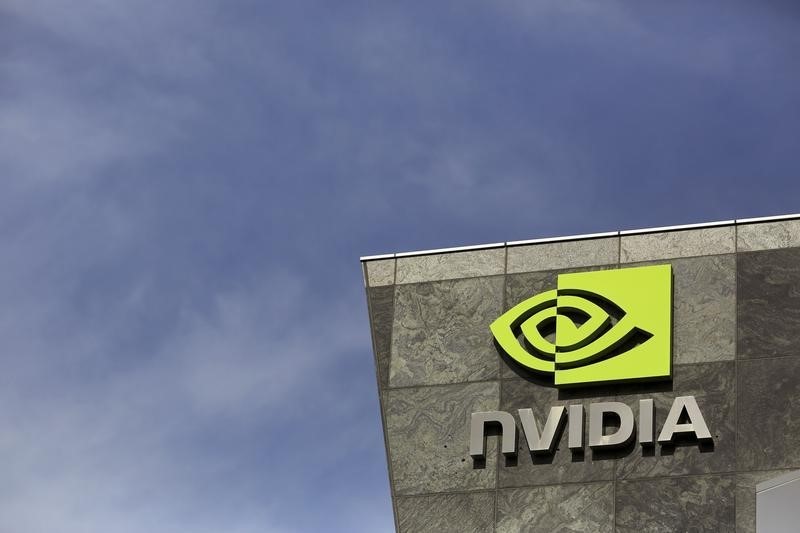Lewis Krauskopf
NEW YORK (Reuters) – A huge rally in Nvidia Corp (NASDAQ:) stock has investors wondering whether they should cash in, hold on for bigger gains, or chase a stock that has tripled in the past year.
Nvidia this week briefly became the largest U.S. company by market value as its share price surged more than 1,000% since October 2022. Over the past 12 months it has grown by 206%.
Nvidia officials say even more growth is expected. The Santa Clara, California-based company is at the forefront of a major technology shift as a dominant supplier of chips supporting artificial intelligence applications. Revenue is expected to double this fiscal year to $120 billion and rise to $160 billion next year. By comparison, Microsoft (NASDAQ:) is expected to grow revenue by about 16% for the fiscal year.
Stunning stock performance attracts investors who are afraid of missing out on additional gains. However, it has also boosted Nvidia’s share price, with its forward price-to-earnings ratio up 80% this year, for example. This could make the company’s shares more vulnerable to a sharp decline when bad news breaks.
“What has been done in the past … should not drive investment decisions,” said Chuck Carlson, chief executive officer of Horizon Investment Services. “However, with a stock like Nvidia, it’s very difficult not to let that not be a factor in your investment decision because you have a sense of the chase.”
FORWARD AND UPWARD
So far, Nvidia’s stock price trajectory has rewarded optimistic investors and punished doubters. The stock is up 164% so far in 2024 as its market value has risen to more than $3.2 trillion, briefly ahead of Microsoft and Apple (NASDAQ:) this week.
Optimistic investors point to Nvidia’s dominance in the AI chip sector as a key reason for their optimism.
The high performance of Nvidia chips makes them difficult to replace in artificial intelligence data centers. Added to this is its own software environment, which developers use to program artificial intelligence processors.
Ivana Delevska, founder and chief investment officer of Spear Invest, remains bullish on the prospects for Nvidia shares as she expects earnings to exceed Wall Street analysts’ forecasts.
Nvidia is the largest holding in the Spear Alpha ETF with nearly 14% of the fund’s shares.
“If the (share) price went up like it did, but earnings didn’t really change, yes, we would be very concerned,” Delevska said. But “where we are, there is pretty solid income support.”
Indeed, Nvidia’s forward price-to-earnings ratio of about 45 is only marginally above the five-year average P/E of 41, even after rising from 25 at the start of the year, according to LSEG Datastream. At the same time, this estimate has decreased from more than 84 a year ago.
Tom Plumb, president of Plumb Funds, said he believes the capabilities of Nvidia chips beyond artificial intelligence are underappreciated. The firm has held Nvidia shares for more than seven years, making it the largest position in its two funds.
“What we’re really talking about is data and access to data,” Plumb said. “And they have the fastest, smartest chip that allows it.”
ATTENTION AHEAD?
Others have become wary of Nvidia’s prospects for stunning future success.
Nvidia has a “truly revolutionary” product and has seen “unprecedented growth,” said Gil Luria, an analyst at DA Davidson. However, he has a “neutral” rating on the stock and a $90 price target, down from the stock’s $130.78 price on Thursday.
Looking several years ahead, Luria said he doubts Nvidia’s customers will spend enough to justify Wall Street earnings estimates that support the company’s valuation.
“The caution about Nvidia comes from a long-term perspective,” Luria said. “That kind of performance is very difficult to maintain.”
Billionaire investor Stanley Druckenmiller said last month that he had trimmed his big bet on Nvidia in 2024, telling CNBC that “AI may be a little overvalued now, but it’s undervalued over the long term.”
Carlson of Horizon Investment Services says Nvidia is a buy, but the stock’s relatively high valuation would keep the company out of Horizon’s roughly 30-stock portfolio.
Other concerns include possible competition eroding Nvidia’s leadership position in the market. Tech giants Microsoft, Meta Platforms (NASDAQ:) and Alphabet (NASDAQ:), which owns Google, are competing to build out their artificial intelligence computing capabilities and add technology to their products and services.
Analysts at Morningstar, which has a fair value of $105 per share, said leading suppliers such as Amazon (NASDAQ:), Microsoft and Meta Platforms will eventually seek to reduce their dependence on the company and diversify their supplier base.
“Nvidia dominates the artificial intelligence space today, and there’s no limit to the company’s profitability if it can maintain that leadership over the next decade,” Morningstar’s Brian Colello wrote this month. “However, any semblance of successful development of alternatives could significantly limit Nvidia’s growth potential. ”


